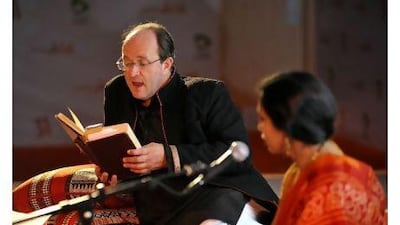The audience at the Sharjah book fair was transported to the splendid Mughal Delhi of the 1850s, the cultural capital of North India under Bahadur Shah Zafar's rule, as William Dalrymple read from his book The Last Mughal and the singer Vidya Shah accompanied him with her soulful renderings.
Through his book, Dalrymple leads us into an interesting era of multiculturalism: when the British took to wearing Indian clothes, commissioned Indian art and patronised Urdu poetry, while the Mughals participated in Hindu festivals. It was an era of cultural brilliance, boasting the greatest of Urdu poets such as Mirza Ghalib, at a time when the Mughal empire was in decline.
And that's exactly why it's a period Dalrymple loves writing about. He's written a number of books about this period, including The Last Mughal and White Mughals.
"It's not the period most people associate with the great Mughals. I've always loved the period. It's a period not written about much. Everyone is acting contrary to their proposed stereotypes. It saw some of the greatest art produced in India and also the high point of Urdu poetry," says Dalrymple in an interview before the unique musical book reading at the book fair.
"It's [in] the last flickering of the lamp that you get the most extraordinary flashes of brilliance … And to have a period where so much is going on and so little is written about it is like [being] a child in a sweet shop," he says.
But as Dalrymple reads out lines about the Mughal decline, the British emerging supreme and the fear among Indians, the mood of the evening changes and Vidya Shah renders a sad, stirring musical piece, Dil Hi Toh Hai, by Ghalib.
So how did the idea of combining a book reading with music come about?
"Mixing music and words makes both more interesting. Music with a bit of literary narrative comes alive," he explains.
"Vidya's done amazing work and found on her own, often from ethnographic surveys done during the Raj, these lyrics and melodies which directly reflect the content of the book. So we started with The Last Mughal and we have taken it to Singapore, Washington, Hay-on-Wye. This is the first time in the Arab world."
Emotions swell as Dalrymple reads out how Zafar was imprisoned in his own stables and finally exiled after the mutiny of 1857, when Indian soldiers revolted against their British officers, stirring patriotic passions.
Shah, who is trained in Hindustani classical music, heightens emotions in the room by rendering an elegy on the devastation of Delhi and ends with what is believed to be Zafar's last verses, one of whose lines translates as: "Now I am a person of use to none."
What is also reflected in Dalrymple's books is his love for the Indian capital, which he also calls his second home.
"I keep coming back to Delhi because I write about it. It is oddly unwritten. Delhi, despite being the capital, is more of an unloved city as its population consists of refugees or migrants now.
"I was a man keen on Middle Eastern archaeology. I wanted to dig in Iraq and Syria, but at the last minute Saddam Hussein closed down the British School of Archaeology. My best friend was off to India so I got on to the plane with him and I'm still there."
Another strong current that runs through his books is a quest to uncover the multiple facets of spirituality or religion.
"That's probably because I grew up in a very monocultural, provincial Scotland. And suddenly, at 18, to arrive in an entirely different world where there were five different religious holidays celebrated in a single week, many languages … I was completely bedazzled by India from the very beginning," he says.
And he could write endlessly about South Asia. "After 30 years, I feel I could keep going without a writer's block."
His next book, Return of a King: The Battle for Afghanistan, is a retelling of the First Anglo-Afghan War.
"The idea for this book started in 2008 when the Afghan war started going wrong. I had read a book called The Great Game by Peter Hopkirk and I suddenly saw that history was retelling itself."
Ask him why people should know their history and Dalrymple is quick to reply. "In the absence of knowledge about one's culture, there's a lot of myth-making. You get a 'chutnified' version of history and you have things going badly wrong."

